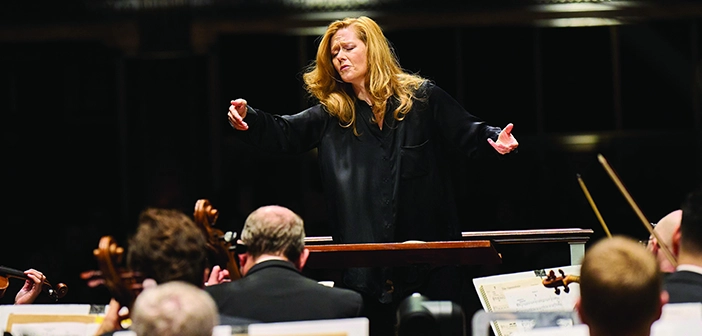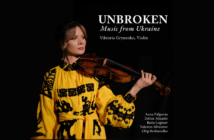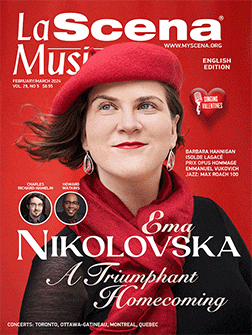
This page is also available in / Cette page est également disponible en:
![]() Francais (French)
Francais (French)
Fifty-two-year-old soprano Barbara Hannigan is looking toward the future. Born in Nova Scotia, Hannigan has been travelling around the world in search for innovative ideas since she embarked on a professional career in Toronto, at 19 years of age. Apparently, her openness to creative musical genres has been a force of artistic renewal. Because of Hannigan’s hard work, her vocal-performance career has turned into a conducting career, in which she specializes in innovative productions. Her loyalty toward past mentors and her current standing as a mentor for younger generations are a testament to the value she gives to interpersonal relationships and idea-sharing to implement projects.
Hannigan has been linked to avant-garde music circles mostly because of the intensity of her productions and insane risks she takes on stage. Hannigan’s performance of Ligeti’s “Mysteries of the Macabre” was one of many highlights of the fourth Montreal/New Musics Festival in 2009, where she was dressed in a black leather costume and a wig. During Hannigan’s second visit to Montreal after 13 years of absence, she left the audience breathless at Maison symphonique last year. She sang Luigi Nono’s Djamila Boupacha from the top of Grand Orgue Pierre-Béique, coming down to the stage to sing Lonely Child by Claude Vivier. “The OSM (Orchestre Symphonique de Montréal) has a sensitivity, discipline, and sound that I like a lot,” she said. “I performed for Montreal audiences three times; the last performance was for families. It was such a touching experience to sing Lonely Child in front of children in the performance hall.”
On Feb. 21 and 22, Hannigan will conduct the OSM musicians in a performance of Francis Poulenc’s La voix humaine, a North American première that will take the form of a multidisciplinary show in collaboration with two video artists.
“The opera La voix humaine is dear to my heart, for I sang it at Opéra Garnier in a 2015 production—five years after becoming conductor at the Théâtre du Châtelet in Paris. The opera was undeniably successful. It revolves around control and a woman who wants to have power over herself, her lover, the extremely peculiar situation. The woman talks about creativity, imagination, and lies. I felt that the topics presented in the opera were ideal for an extremely off-the-wall presentation. I spoke to filmmaker Denis Guéguin. Together with Clemens Malinowski, we came up with a staging idea where I was facing the orchestra with my back to the audience; three cameras were on stage, and a large screen was behind the stage. It feels like a virtual conversation.”
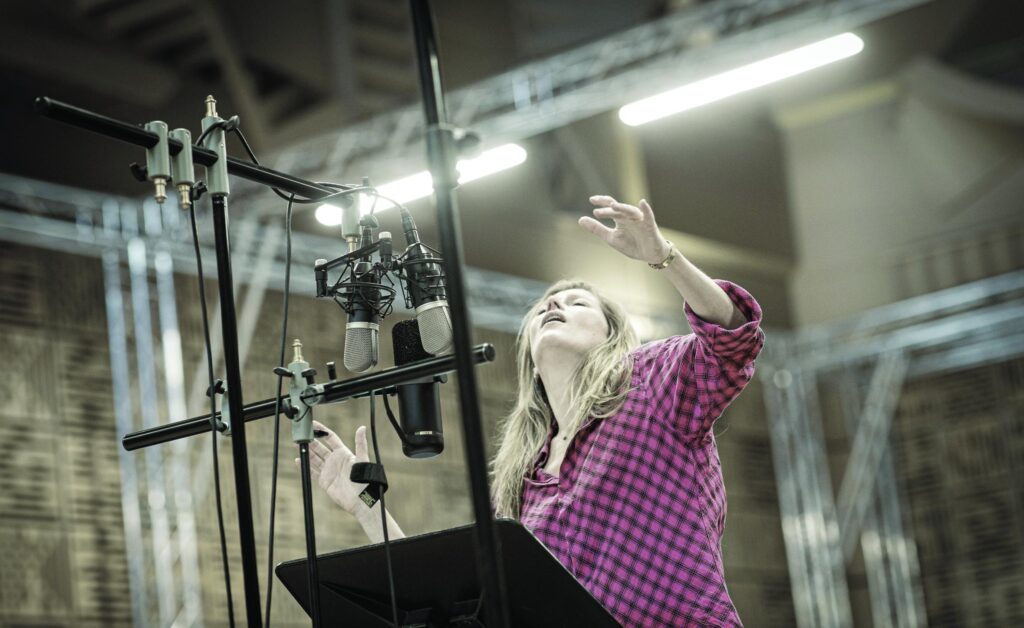
Barbara Hannigan in a recording session (Photo by Annelies van de Vegt)
When La voix humaine was being produced by Orchestre Philharmonique de Radio France before the 2021 première, Hannigan couldn’t imagine how hugely popular videoconferencing applications would become. That said, she stuck to her initial intuitions that are more relevant than ever before because of our new ways of working. Hannigan wanted to overlook the telephone and use on-screen projections as expressions of a woman’s imagination. “Don’t take everything she says literally. You can’t take the play by Jean Cocteau literally, either. This woman likes using her imagination; it’s likely that the romantic relationship or lover exists only in her own mind. This is why I wanted to bring La voix humaine to life. I don’t think this kind of lyric theatre has ever existed before,” she said.
It’s uncommon to see a singer conduct an orchestra, perform a solo role, and be filmed live. It took lots of work to memorize texts and fully grasp the score. Hannigan gave specific conducting gestures and spoke closely with the OSM musicians to ensure her vision of the work lined up perfectly. “I’m in the character’s skin when I walk on stage. In this case, the character is the woman who will conduct and sing at once. This woman thinks she’s Barbara Hannigan in front of the OSM at Place des Arts.”
According to Hannigan, La voix humaine is like a psychological thriller worthy of Alfred Hitchcock’s greatest films. She wants the audience to have a really wonderful experience. “This will be an exhilarating performance, especially for the musicians, as they’ll constantly be on the lookout. My conducting gestures could change from one performance to the next. This is a gargantuan task for everyone—for the orchestra, for me, for the technicians. Malinowski will have cameras on my face and hands. He may sometimes double or triple the images.”
In addition to La voix humaine, the concert will feature Metamorphosen (Metamorphoses) by Richard Strauss. “I wanted to begin the concert with Metamorphosen because I think it deals with topics similar to La voix humaine, such as solitude, loss, isolation, gloom, and living in the past,” Hannigan said. “The feeling of sincerity is also obvious. Acting and manipulation are part of Poulenc’s opera, but the character eventually expresses their true emotions, just like performers do. Beyond all the virtuosic gestures, it’s especially important to perform with authenticity.”
Equilibrium
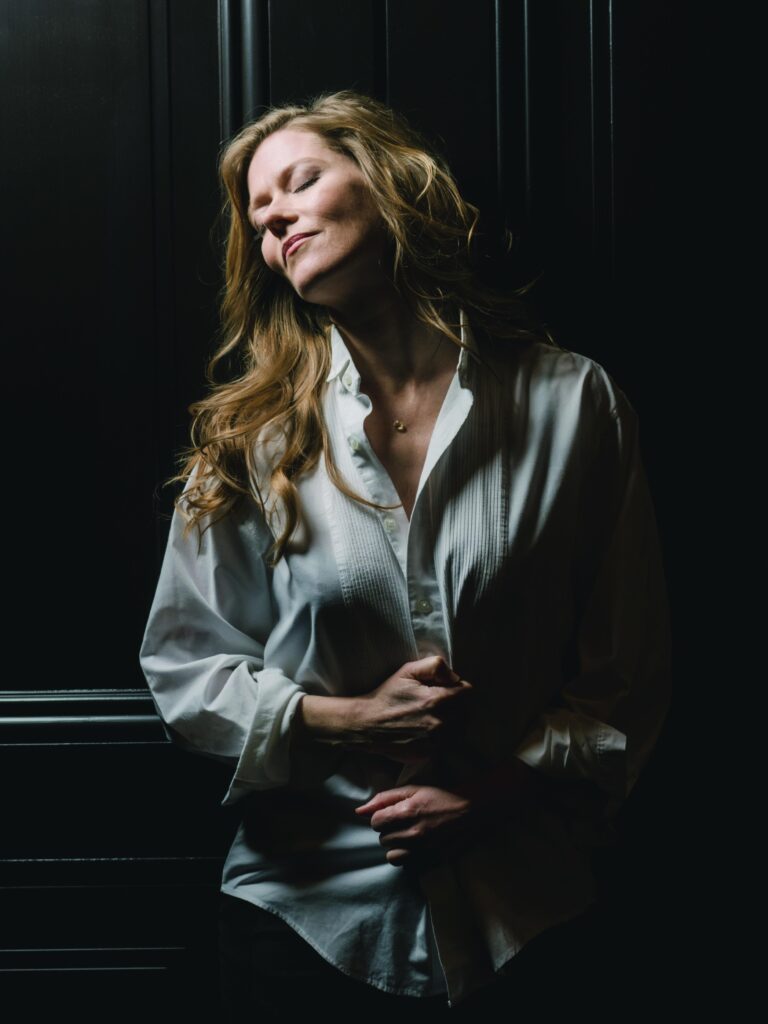
Barbara Hannigan (Photo by Marco Borggreve)
“Music is akin to sports. I’ve put in 10 000 hours of music since I was 5. It’s about physical and mental discipline as well as team spirit.”
Hannigan founded Equilibrium in 2017, a mentoring program that directs young professional musicians at the start of their careers. To ensure musicians are as successful as possible, Hannigan has called on many sport professionals, including soccer, swimming, and tennis coaches. Hannigan even calls herself a coach. “When I was younger, I worked a lot on myself and my mental discipline. Nowadays, I’m at another stage in my life. I’m sharing my experience with youth and my colleagues. After all these years, it’s not easy to be an artist when you’re touring for almost 11 months per year, meeting audience expectations, and managing pressure before going on stage. Despite these hardships, I enjoy the great emotions that come from these experiences. Music is an enduring sport that takes time to master. It’s like being part of a marathon,” said Hannigan after 33 years of experience in the industry.
To Hannigan’s great delight, Equilibrium now has approximately the same quantity of singers as it does conductors. Though Hannigan is now a mentor, she’s cognizant that artists never stop learning about themselves and their careers. “For example, a young conductor from Costa Rica has occasionally been travelling with me for the past three years. He was with me when I was touring Switzerland at the beginning of January. ‘You’ve changed my life, Barbara,’ he said. I replied: ‘You’ve changed my life, Luis.’ The learning experience must be reciprocated, for it takes lots of energy to be a mentor. Mentoring gives you energy, too. It’s all about sharing ideas.”
Hannigan began a new production of Stravinsky’s Rake’s Progress a few weeks ago. The Rake’s Progress was presented by Equilibrium during the 2018–19 season. From Feb. 2 to 7, 2019, current and past Equilibrium members toured Sweden and Germany with the Swedish Chamber Orchestra. “The Equilibrium mission has no time limit; it must live on,” she said.
Hannigan is putting a lot into herself in every sense of the word. She’s been able to count on support from Société Générale, a leading financial group across Europe, for the past three years. After all, she’s still contributing a percentage of her honoraria toward Equilibrium. “It’s probably unnecessary to contribute a percentage toward Equilibrium, but I think it’s necessary. Professional musicians who have had a successful career need to give back to the younger generation in the name of art and classical music,” she said. “Even I had the opportunity to benefit from other people’s generosity. I couldn’t pursue a career on my own.”
Mentors
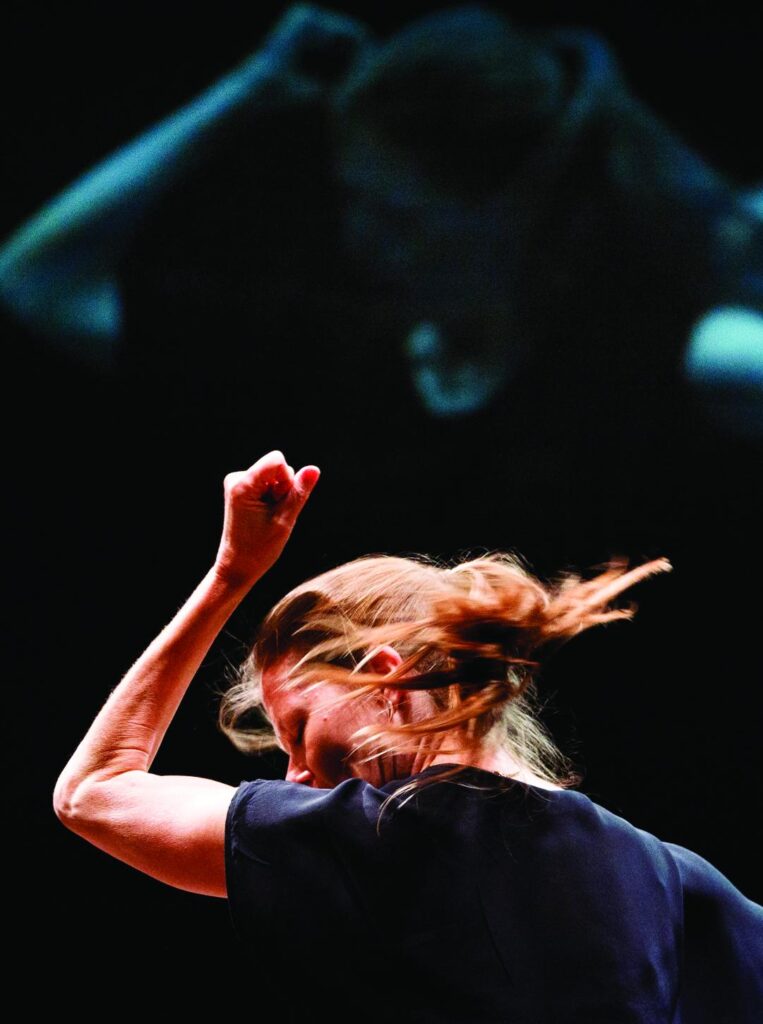
Barbrara Hannigan in La Voix Humaine at Accademia Santa Cecilia (Photo by Musacchio e Ianniello)
Hannigan talks openly about the mentors who marked the early years of her career. Educational encounters gave her opportunities to grow as an artist during her many visits overseas. She received many tips and a lot of advice to nourish “her deep satisfaction of being a musician.” Dutch pianist and conductor Reinbert de Leeuw has a special place in her heart. “Leeuw was my mentor since I was 25—the time I arrived in the Netherlands. Together, we presented over 75 concerts and produced a few recordings. Leeuw died in February 2020, just before the pandemic. However, he’s in my heart every day. I often think about his advice and ask myself what he would think about a few matters I deal with daily. I’ve been lucky to have his piano at home (during the interview at Hannigan’s home in France’s northwest region of Brittany, she showed us the piano in the middle of her living room); I still have many of his books, his metronome, his conducting batons. He’s still with me.”
Of course, Reinbert de Leeuw’s legacy isn’t just about material possessions. “He taught me the crucial lesson of being authentic,” said Hannigan. “This lesson has strengthened my passion and given me energy. Nothing can work if I’m doing something I’m not passionate about.”
Since assuming conducting positions, Hannigan has been inspired by other colleagues and artists who seem to have authentic approaches. These individuals include Leonard Bernstein, who was recently paid a tribute in the film Maestro; Sir Simon Rattle, who recently worked with Hannigan; and Yannick Nézet-Séguin. “I believe technical mastery is at any conductor’s fingertips; however, every conductor needs authenticity. I’m obsessing over Barbra Streisand right now, she’s always looking for opportunities to do something new. She has always had strong character and a certain vulnerability. She has been a director, an actor, and a singer—I’m inspired by risk takers, those who have an artistic approach, as well as those who are curious by nature.”
Montreal: Looking to the future
Hannigan will be in Montreal for a week following La voix humaine by Poulenc. She’ll be the soprano soloist in the song cycle In the half-light by Zosha Di Castri on Feb. 28 and 29. She performed this very cycle as a world première with the Toronto Symphony Orchestra in May of 2022. Hannigan will perform at Bourgie Hall with pianist Bertrand Chamayou for the first time in November 2025, performing a recital dedicated to Olivier Messiaen. “Chamayou and I recorded an album that will be launched in April. Poèmes pour Mi, Chants de terre et de ciel, and La mort du nombre will be featured on the album. Each musical work reveals a great love for Claire Delbos, Messiaen’s first wife, and their son Pascal. After Leeuw died, I was looking for a partner with whom I could perform this repertoire and recital. That partner is Bertrand Chamayou.”
Translation by Dwain Richardson
Education
Hannigan graduated from the University of Toronto with a Bachelor of Music degree in 1993 and a Master of Music degree in 1998. She continued her studies at the Banff Centre for the Arts, the Steans Institute for Young Artists at the Ravinia Festival, and the Centre d’arts Orford. She also studied for one year at the Royal Conservatory of The Hague.
Upcoming
To find out when and where Hannigan will perform, visit www.barbarahannigan.com and www.equilibrium-youngartists.com.
Playlist
This page is also available in / Cette page est également disponible en:
![]() Francais (French)
Francais (French)

